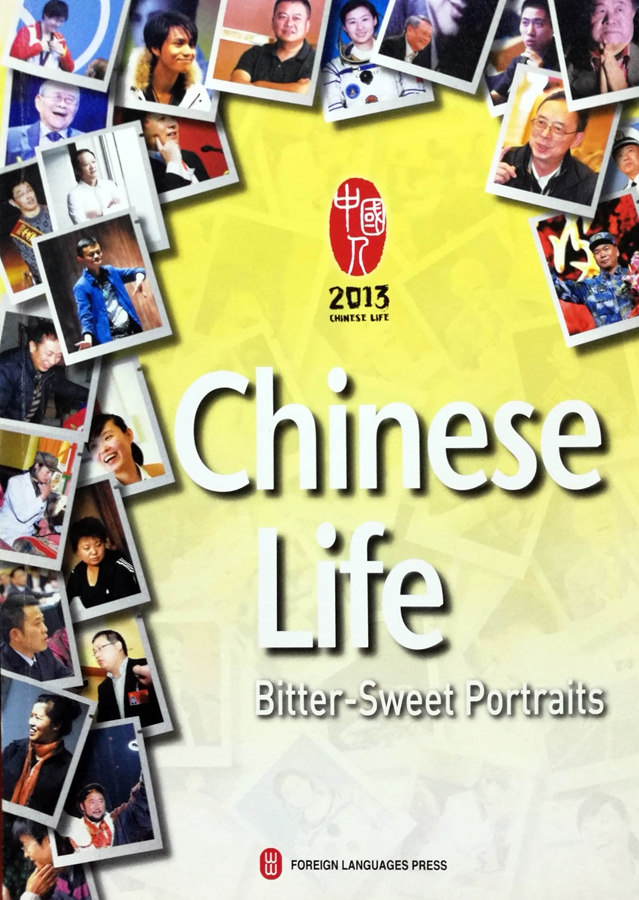
Chinese Life – Bitter-Sweet Portraits
Executive Editor: Wen Fang
Price: RMB 128
Paperback, 225 pages
Published by Foreign Languages Press

Chinese Life – Bitter-Sweet Portraits
Executive Editor: Wen Fang
Price: RMB 128
Paperback, 225 pages
Published by Foreign Languages Press
AS humans hold cherished dreams, so do nations. In an era when everyone is discussing the Chinese dream, it is a necessity to understand that the Chinese Dream is in fact its people’s dream. This book tells the tales of 24 Chinese pursuing their dreams, following their trials and tribulations, it takes the reader on a captivating journey across their joys and sorrows, tears and laughter, and in doing so, also reflects the story of China’s development and transformation.
The book is divided into five different sections, which are Recreation & Sports, Science & Technology, Business Elite, Great Love, and Ordinary People’s lives, each representing stories of Chinese people in those areas. Among them are Mo Yan, a writer who won the 2012 Nobel Prize for Literature; Liu Yang, the first female astronaut who successfully completed an outer space task from the spacecraft “Shenzhou-9;” Ang Lee, renowned director who won the 85th Oscar Award for Best Director and is the first Asian director to receive the award twice; Jack Ma, an entrepreneur who is the first from China’s mainland to appear on the cover of the U.S. financial magazine Forbes; Ye Shiwen, an athlete known as “Flying Fish Girl” who broke world records and won two Olympic gold medals at the 2012 Olympics in London; Zhang Lili, a teacher praised as “The Most Beautiful Female Teacher” who lost both legs in a car accident in order to rescue her students; Peng Yan, a military nurse who is known as the “Alpine Snow Lotus”; and Cheng Junrong, a migrant worker who was also a delegate to the 18th CPC National Congress.
Their stories are pieced together to illustrate the common experience of the Chinese people and great transformation of the nation: its booming economy, strength in science and technology, people’s colorful lives, frequent business and trade between nations, surging happiness index, and people’s sense of gain and joy.
The book is authored by reporters who traversed across the country to do interviews inside farmer’s houses, at factories , and on farmlands. Their love for the motherland, industrious work, and vision urged them to record these stories on their journeys. As witnesses and narrators, their writings also make these characters come alive.
Chen Xiaoqing, general director of a food documentary A Bite of China which attracted great attention from home and abroad, is a major character of this book.
When Chen was asked about his purpose for shooting this documentary, he replied, “We hope to present to the audience the Chinese people’s living conditions, the relationships between food, people, and society, as well as multiple cultural traits of Chinese cuisines.”
Chen is a true gourmand, and is equally high spirited when at work. After graduating from the Beijing Broadcasting Institute in 1989 (now the Communication University of China) with a major in photography, Chen found a job in CCTV shooting documentaries. At that time, it was a very rewarding job. However, after 2000, documentaries had deteriorated and their broadcasting time was readjusted to midnight, which led him to depression. Even so, Chen never abandoned documentary filmmaking. He wrote on his blog then, “We are willing to be lonely since a documentary itself is lonely.” Things changed in 2003 when China faced an unprecedented fight with the SARS virus epidemic. Chen and his colleagues filmed Sixty Days in Ditan Hospital, a detailed record of the story of Chinese people who fought against SARS together. This experience enabled the world to realize the value of their documentaries. The old high-spirited Chen was back again.
Chen was also given a nickname “Street sweeping mouth” by his colleagues because he would like to conduct a blanket search along the streets of Beijing. Whenever he found good restaurants, he would find an opportunity to try them, and carefully record their names and addresses. His cell phone eventually became a treasure trove of names and addresses of the best cuisine available in Beijing. This in-depth knowledge led Chen’s documentary to become an instant success.
In the first week of the documentary’s launch, its rating on douban.com was as high as 9.6, higher than many Hollywood blockbusters. Chen, with his distinct taste for food, extensive knowledge of Chinese cuisine, and professional photography skills, presented the world with profound food culture and made those warm stories with a Chinese taste.
Besides well-known public figures, ordinary people’s lives are also examined in the book. “The Community’s Old Lady” is what Chen Fenglian is called by the residents of the community where she works. Like many women who were laid off by state-owned enterprises, Chen began to look for a new job when she was let go in 2002. Eight years passed, she has grown to be an outstanding community worker and the dean of the Neighborhood Committee of the community.
“Community work is like passing a thread through the eye of a needle which requires both patience and dedication.” Creating a harmonious community is the core of Chen’s work. As for her, a community is like a big family and a community worker who manages big and small issues should act as the head of a family. Everything she says and does aptly represents an ordinary community worker’s duty and dedication.
Many foreign readers cannot understand why the term Chinese Dream in government reports is the common aspiration of every Chinese person. Upon reading this book does one realize that the mosaic of diverse lives and hopes all comes together to form the tapestry bound together by the common Chinese Dream of the rejuvenation of the Chinese nation and its people.